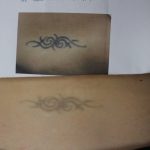Laser Tattoo removal – What should I consider before going ahead?
Tattoos have been around or many many years. It was in 1898, when the aristocracy of Europe had got into tattooing their skins in a big way. Then, as now, we Brits were at the forefront of the craze.
Techniques have changed over the years and we now rarely see the old “stick and poke” method being used, but more modern machinery to more accurately control depth of ink and I hasten to add, some tattoos can be pretty spectacular!
It is estimated that one in five people in the UK have a tattoo. If the tattoo has been researched thoroughly, most people are happy with their designs. However, it’s been estimated that a quarter of those with a tattoo regret having one done – and that’s where Nurse Practitioner Janine can help!
Laser tattoo removal is a really effective way to remove unwanted art work from your body. The procedure involves passing an ND Yag laser over the area of skin where the tattoo sits. The process works by breaking down the pigment in your skin, allowing the smaller ink particles to be absorbed by the body bit by bit. Tattoo removal takes multiple sessions (generally more than 12!) and how many depends on a variety of factors including the colour of the tattoo you wish to be removed and your skin type.
It is an effective treatment and can create some amazing results, however there are some things that you need to be aware of and consider before going ahead with laser tattoo removal.
We’ve put together a list of 7 key things you need to consider before getting laser tattoo removal:
- Before getting the treatment you should be aware that tattoo removal can never be completely guaranteed. In some cases the tattoo might only partially fade, leaving behind a partial pigment. This can, in some cases, even look like a scar. We cannot know the contents of the ink that has been used, it has been reported that traces of acrylic have been found in some tattoo inks. This will not be removed with laser. Some medical conditions and/or medications make tattoo removal unsafe, so your Nurse will check your medical history thoroughly to ensure we don’t take unnecessary risks.
- The location of your tattoo can also have an impact on the result of treatment. Tattoos that are located on the more sensitive parts of the body can be harder and (sorry to say) more painful to remove. Tattoos located closer to the heart have better circulation and so will often heal quicker.
- It may be difficult for your practitioner to give you an accurate time-scale and number of treatments required for the tattoo removal as each tattoo and each person responds differently to treatment. Once you have undergone the first treatment they will be able to advise more on this but you must be aware that we (or any other practitioner) can’t guarantee results. If you are getting married you need to be aware that it can take 2 years to remove a tattoo as sessions are 8 weeks apart minimum.
- The colours in your tattoo can also effect the treatment results as different lasers may be needed, which operate at different wavelength of the colour spectrum. Some colours may be harder to remove than others. Your practitioner will be able to advise you more on this at consultation. Generally, white and yellow pigments are nearly impossible to remove.
- Following strict after-care is important to maximise the results of your treatment. You should also be aware that the treatment area may be red, blistered, raised or slightly swollen after treatment (don’t panic this is normal!) and so it is important to keep the area clean an away from any sun. We recommend the use of 100% Aloe Vera Gel post procedure. However, your practitioner will go through all the after-care advice with you at the consultation stage plus at each visit. Smoking and anti inflammatory medication can have a negative impact on tattoo removal results .
- Some pigment used in cosmetic tattoos, may appear darker after treatment due to the oxidisation process. Don’t panic- this can usually be corrected with follow up treatments. Reddish / Brown pigments are particularly susceptible to this so can be very obvious with eyebrows!
- Tattoo removal is generally more effective in tattoos that are over a year old. The older the better for best results. We cannot undergo tattoo removal on tattoos that are under 2 months old – minimum.
Laser tattoo removal really is an effective way to remove unwanted art work from your body. We just think its important that you are well informed before going ahead with any treatment. If it’s something you are considering then come and see us for a consultation and we will be able to advise you further after having a good look at that unwanted tatt!!

